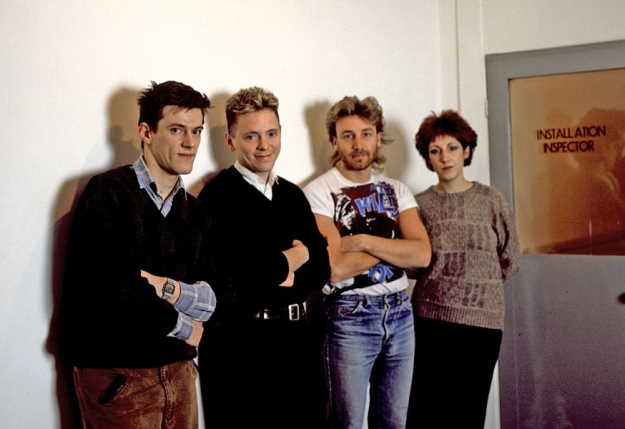|
Taken from Far Out Magazine (Jan 30, 2022)
The album that allowed New Order to display perfect 'Technique'
8.9 of 10
by Jordan Potter

New Order 1982. Credit: Alamy |
It has been 23 years to this very day that New Order released their most eclectic album, which seemingly marked the beginning of the 1990s a year early.
New Order developed their sound gradually over the 1980s. When they started out in 1981 with their first album Movement, the group were only just returning from the tragic death of their Joy Division bandmate Ian Curtis. The album was an uneven scattering of ideas that reflected a group that perhaps hadn't quite found their new direction. At this early stage, it was still undetermined who would be the new lead singer for the group and so the record included some rare occasions to hear Peter Hook's vocals on the fantastic 'Dreams Never End' and 'Doubts Even Here'.
By 1983, New Order had found their footing and had stridden from beneath the shadow of Joy Division deciding to stick to all new material after the rerelease of Ian Curtis' song 'Ceremony' in 1981. The 1983 album Power, Corruption & Lies showed Bernard Sumner as the permanent singer for the group and it was clear from this masterpiece that the group had regained the confidence they had been developing with the leadership of Curtis three years prior. The album shows a great development of sound with the addition of Gillian Gilbert on the synthesiser adding an electronic edge to proceedings.
Throughout the mid-1980s they would continue to develop their sound releasing a number of classic dance-pop anthems such as 'Blue Monday', 'True Faith' and 'Bizzare Love Triangle' in amongst their wider body of material, which still retained elements of their post-punk roots. By the time they were recording their fifth studio album Technique, it appeared they were ready to take one step further into the realm of electronic music, welcoming traces of acid house and rave music into some of the tracks. The album, along with the Happy Mondays' 1988 album Bummed, seemed to ignite the rave scene of "Madchester" that would ensue moving into the 1990s.
The album was, quite fittingly, recorded in Ibiza. The band had decided to record the album abroad on Hook's request after he had become fed up with recording records in "dark and horrible" studios in London. While there, the band soaked in their environment and as it transpires, were particularly influenced by Balearic club music. Stephen Morris described the sound of the Balearic beat clubs on Ibiza as "mad!" before detailing: "They'd put an acid record on and then the next one would be a Queen one-it was schizophrenic, really. It'd be something really Spanish and then something really daft. It was a really odd mix but it all seemed to make sense when you were there. I don't know why that was. Maybe because we were all a bit out of our brains."
It seems the group perhaps had a little too much fun in Ibiza and, upon their return to the UK, the album wasn't quite complete and so they spent some time in Peter Gabriel's Real World Studios to polish the record off. Sumner described Gabriel's studio as a "much more sober atmosphere". The album was completed in 1988 and the group were happy with this new blend of recent influences with their classic sound. Peter Hook described the record: "Technique sounds fantastic [...] considering it's not an Ibizan dance record. I think it catches a summer sound really brilliantly."
The LP was a triumph with a great response from the public and critics alike. It rose through the charts to become New Order's first album to reach number one in the UK Album Chart. The album is a brilliantly seamless blend, with some tracks following New Order's usual style in songs like 'Love Less' and 'Run', but then departs into newfound territory in tracks like 'Fine Time' and 'Vanishing Point' where the addition of acid house inspired synth tracks can be heard. The album still retains that all-important New Order identity though, thanks to Peter Hooks unique high string bass technique and Sumner's delicate vocals.
I still rank Power Corruption & Lies and Low Life just above Technique, mainly due to my leaning towards the post-punk side of New Order's DNA, however, this 1989 release is just as important, if not more so, as it welcomed in the new era of all-night raves in the 1990s alongside Factory label neighbours Happy Mondays.
Listen to the album below to travel back to 1989 and get a flavour of that danceable happy-sad melancholia that only New Order can provide.
|